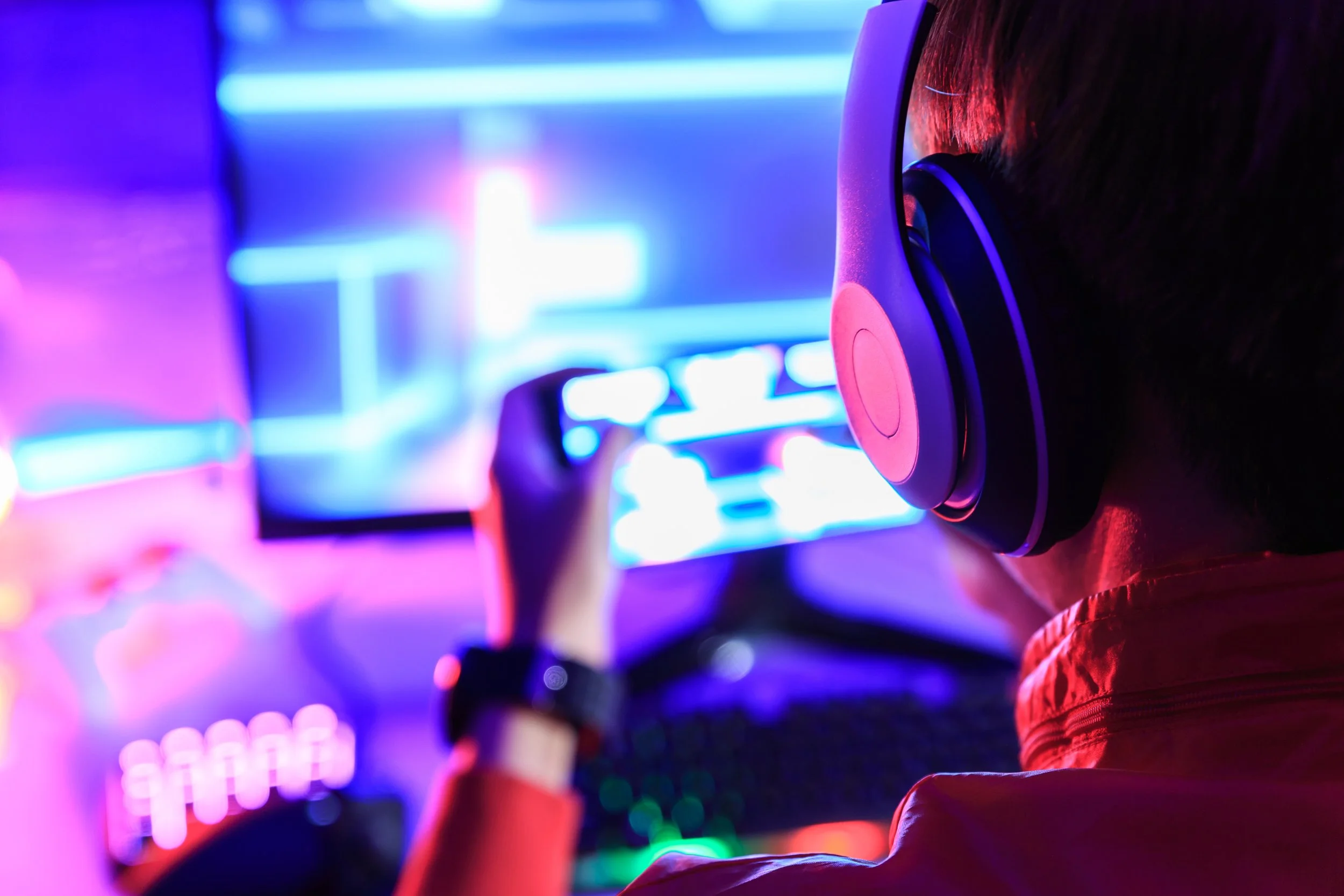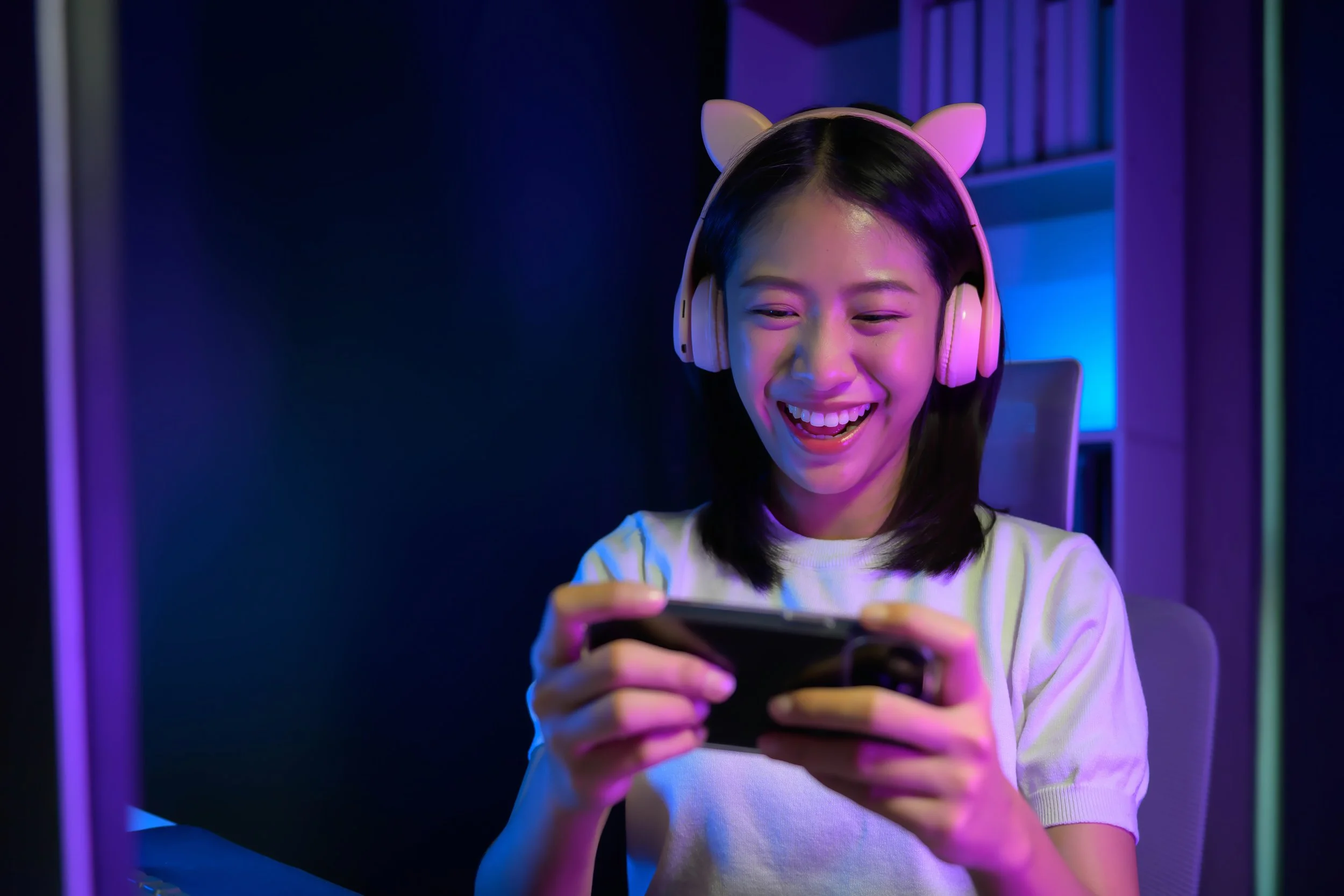WHAT IS THE STUDY ABOUT?
This study is funded by the NSW Department of Education’s Screen Use and Addiction Research Fund, a competitive grant scheme supporting critical research into the effects of screen use on young people’s development and learning. You can learn more about the fund here.
The purpose of Level Up: Understanding Teens’ Videogame Play is to explore how videogame use affects the wellbeing, motivation, and everyday lives of young people aged 14–16. By investigating both healthy and problematic gaming behaviours, the study aims to identify the factors that support balanced digital play and those that contribute to negative outcomes. The findings will inform the development of practical tools and resources for students, families, and educators to promote healthy gaming habits and digital wellbeing.
Why This Matters?
In Australia, videogame play is nearly universal among young people. In 2023, 93% of 5–14 year olds and 91% of 15–24 year olds reported playing videogames, with average playtime exceeding 100 minutes per day (Brand et al., 2023). The COVID-19 pandemic has further increased digital play in children’s lives, raising concerns about screen use and its effects on learning, mental health, and social development.
While gaming can be a positive and creative outlet, some young people experience problematic play (PP) or symptoms of Internet Gaming Disorder (IGD). In Australia, it’s estimated that 500,000 to 2 million young people show signs of Internet Gaming Disorder, with even more affected by Problematic Play (Porter et al., 2010). Despite the scale of the issue, there’s still limited research into what causes problematic play and how to support healthy gaming habits.
What our research has shown so far....
The prior survey included young people aged between 16-25 years old who regularly play videogames. A total of 3203 people (51% men) completed the survey. Respondents reported having more online friends than offline friends and played videogames most frequently on Fridays, Saturdays, Sundays on PC. The most popular genre of videogames were Shooters, following Role-playing games and action-adventure games. Of the total, 10% of people had high Internet Gaming Disorder scores and this group more commonly reported feeling compelled to play, and having lower wellbeing, life satisfaction, and vitality. Conversely, many respondents showed a healthy passion for play which was associated with improved wellbeing.
Meet the Research Team
-

Dr Karley Beckman
Senior lecturer, School of Education
University of Wollongong
Karley is the Project Co-Lead and the Head of Research in the School of Education. She is an internationally recognised researcher in digital technologies in children’s lives, with a strong record of high-quality research that demonstrates impact in advancing theory as well as practical contributions to the development of national legislation, education policy, and understanding of children’s use of digital technologies in the wider community. She is also an Associate Investigator on the ARC Centre of Excellence for the Digital Child.
-

Dr Tiffani Apps
Senior lecturer, School of Education
University of Wollongong
Tiffani is the Project Co-Lead. Her research investigates the digital practices of children and young people across contexts. Tiffani’s work critically engages with dominant discourses associated with children, young people and digital technology. She brings methodological expertise working with and exploring the ways young people learn, play, and connect in digital environments. Tiffani is a passionate advocate for children’s digital rights and regularly works with industry, government and education departments to improve policy and practice. Tiffani is an Associate Investigator on ARC Centre of Excellence for the Digital Child. She is a 2025 Australian Research Council Discovery Early Career Research Award (ARC DECRA) Fellow.
-

Prof Daniel Johnson
Professor, School of Computer Science
Queensland University of Technology
Daniel was the Lead of the NMHRC study, which explored the impact of videogaming on adults. His research focuses on the impact of video games on wellbeing, gamification, motivations for videogame play and the player experience. He has worked in the games industry with companies such as NextGenVideos and The Binary Mill. His research interests include motivations for videogame play, the player experience, the impact of videogames on wellbeing, and gamification. He is co-lead for the ACODA longitudinal study of digital technology use by children and the QUT node leader for the Centre of Excellence for the Digital Child
-

Prof Leanne Hides
Professor, School of Psychology
Queensland University
Leanne is a clinical psychologist with over 25 years of experience working on the interface of alcohol and other drug (AOD) clinical research and practice. She is the Director of the NHMRC Centre of Research Excellence on Meaningful Outcomes in Substance Use Treatment and the Deputy Director of the National Centre for Youth Substance Use Research (NCYSUR). She also develops web and mobile-phone based programs (16 RCTs). Most of this research has been conducted with industry partners (e.g., Lives Lived Well, Qld Health).
-

Prof Regan Mandryk
Professor, Computer Science
University of Victoria, Canada
Regan pioneered the area of affective physiological evaluation for computer games in her Ph.D. research with support from Electronic Arts. With over 200 publications that have been cited over 10000 times (including one of Google Scholar’s 10 classic papers in HCI from 2006), she continues to investigate novel ways of understanding players and their experiences, but also develops and evaluates games for health and wellbeing, and games that foster interpersonal relationships.
-

Prof Sue Bennett
Senior Professor, Deputy Vice-Chancellor (Academic)
La Trobe University
Sue’s research investigates how people experience and learn with digital technologies across the lifespan, integrating psychological and sociological theory with diverse methodologies. With a strong record in research excellence, industry engagement and capacity building, she continues to shape national and international conversations on the future of learning, ensuring universities remain responsive, inclusive and forward-looking in a rapidly changing world.
-

Dr Myrto Mavildi
Associate Professor, Department of Psychology
University of Limassol, Cyprus
Myrto is internationally recognised for her pioneering work on the links between physical activity, learning, and wellbeing in children and adolescents. Her research focuses on designing and implementing school-based physical activity interventions that enhance not only physical health, but also cognitive, academic, and psychosocial outcomes. With a strong commitment to scalability and real-world impact, her work is helping schools reimagine learning environments that nurture both the body and the mind. She is also an Honorary Fellow in the School of Education at the University of Wollongong. She is an Australian Research Council Discovery Early Career Research Award (ARC DECRA) Fellow.
-

Sarah Caouette
Associate Lecturer and Researcher, School of Education
University of Wollongong
Sarah is a doctoral student at the University of Wollongong whose PhD research pioneers new ways of engaging students in the data collection process and examines secondary school students’ use of technology, digital practices, and engagement with artificial intelligence. As a researcher, she has contributed to projects investigating the use of AI among professionals, and the role of social media in primary education.
Sarah is the Project Manager for this study.
-

Emma Hatton
Associate Researcher, School of Psychology & School of Education
University of Wollongong
Emma is a doctoral student at UOW, her PhD research focuses on the assessment and interpretation of outcomes in residential substance use treatment using measurement-based care. She has previously worked as a research assistant on several National Health and Medical Research Council and New South Wales Health–funded trials. Her research interests lie in health psychology and digital well-being, with a particular focus on internet gaming disorder and problematic videogame play. She is also an Associate Research Fellow at Queensland University of Technology and University of Queensland.
-

Henry Cook
Associate Researcher, School of Education
University of Wollongong
Henry is a PhD candidate whose work focuses on digital education, learning innovation, and the evolving role of technologies across learning environments. His current research explores how values-based approaches to educational technology and design practice can foster more equitable and responsive learning environments. Henry’s work examines student transitions, professional identity, ethics in digital learning, and the cultural dimensions of educational practice.
-

Michelle Kirchmajer
Associate Lecturer and Research Assistant, School of Education
University of Wollongong
Michelle is an experienced high school science and mathematics teacher with over 16 years in the classroom, and has served as both Head Teacher and Learning Support Teacher. She has worked across many diverse school settings, including High Potential and Gifted Education (HPGE), online distance education and schools for at-risk teens. She is an advocate for social justice and embedding digital technologies into teaching intentionally. Michelle currently teaches in the School of Education at UOW, where she focuses on evidence-based pedagogies and the effective integration of ICT in realistic classroom contexts.
Contact us
Got questions about the study? Leave your details and a message and we’ll respond.


